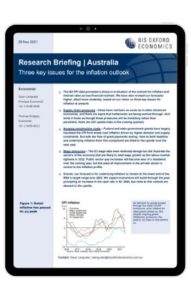Three key issues for the Australia inflation outlook

The Q2 CPI data prompted a sharp re-evaluation of the outlook for inflation and interest rates across financial markets. We have also revised our forecasts higher, albeit more modestly, based on our views on three key issues for inflation at present.
The main themes in this report:
- Supply chain pressures – these have not been as acute as in other advanced economies, and there are signs that bottlenecks are being worked through. And while it looks as though these pressures will be transitory rather than persistent, there are still upside risks in the coming quarters.
- Housing construction costs – Federal and state government grants have largely insulated the CPI from sharp cost inflation driven by higher demand and supply constraints. But with the flow of grant payments easing, risks to both headline and underlying inflation from this component are tilted to the upside over the next year.
- Wage pressures – The Q3 wage data were relatively benign but did illustrate the sectors of the economy that are likely to lead wage growth as the labour market tightens in 2022. Public sector pay increases will become less of a headwind over the coming year, but the pace of improvement in the private sector is central to the inflation profile.
Tags:
Related Services

Post
Eurozone: Little sign of harm from the Red Sea disruptions
The impact of Red Sea shipping disruption on the eurozone economy continues to be limited, in line with our baseline view. Our new Eurozone Supply Stress Indicator suggests that supply pressures have returned to normal following a period of easing in 2023.
Find Out More
Post
GCC: Key themes shaping city economies in the near term
For Gulf cities, the near-term outlook will be tied not only to the global macroeconomic backdrop, but also the progress of the diverse visions and strategies in the region. With the aim to diversify their economies and reduce the dependence on oil, Gulf states continue to invest in the non-oil economy and implement various reforms. That said, oil revenues remain key to funding diversification efforts.
Find Out More